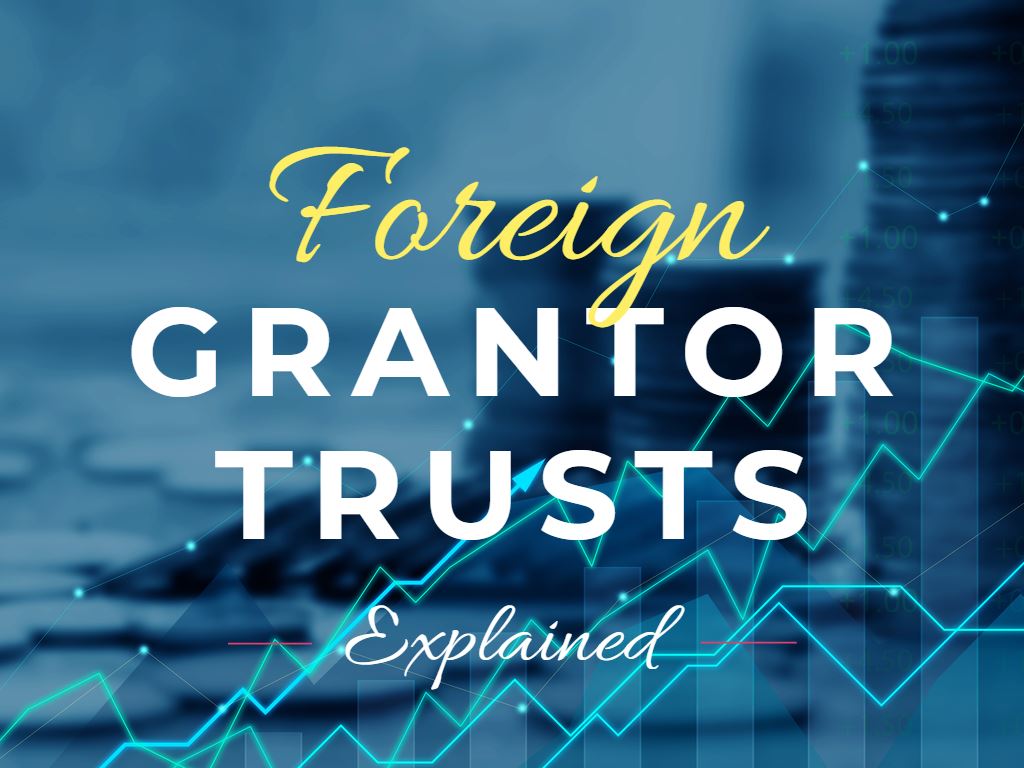Whenever a tax professional doesn’t know what to call something, they call it a “foreign grantor trust” as a cop-out. 99% of the time, they’re wrong. Allow us to explain.
A trust is really just an arrangement; usually a “gift with strings attached.” It’s not an entity! Again, it’s an arrangement between the person gifting property (settlor), the person holding legal title to the property but isn’t really the owner (trustee), and the person who is the real intended owner (beneficiary). So basically, it’s a relationship that has a tax identification number. Think of it, for example, like a joint tax identification number for a married couple (doesn't actually exist); except this identification number is for a relationship between a settlor, a trustee, and a beneficiary.
Why wouldn’t the settlor just gift the property to the intended beneficiary? Well, maybe the settlor only wants it to be used for education, or maybe the settlor is the father and beneficiary the son with a drug addiction who can't be trusted with that much. Whatever the reason, the settlor does not want to gift the property outright.
Now, when there is an attempt to transfer legal title to property to a third-party, this arrangement must be analyzed under both the income tax rules and the gift/estate tax rules to determine how it should be reported.
Under gift/estate tax rules, it’s either a completed gift whereby the settlor can never legally get it back, or it’s a legally incomplete gift that won’t actually be respected for gift tax purposes; it’ll be as though nothing happened for gift/estate tax purposes.
Under income tax rules, on the other hand, it’s either an irrevocable transfer of ownership with the trust now having to file its own tax return, or the attempted transfer is deemed to be revocable, which means the original owner is deemed to still own the property; in other words, it’s as though nothing happened and any income generated by the property must still continue to be reported on the owner’s personal income tax return.
I know it seems bizarre. Why would you need to analyze the same thing twice? Welcome to the insanity of tax law.
Now, depending on the classifications under both gift and income tax rules, you can end-up with a unique result, which is best demonstrated with this chart:
Income Tax Classification | Gift Tax Classification | Resulting Trust Type | Explanation |
Irrevocable Ownership Transfer | Completed Gift | Standard Trust | Used to Transfer Wealth |
Irrevocable Ownership Transfer | Incomplete Gift | Incomplete Non-Grantor (ING) Trust | Used for Lawful State Tax Avoidance |
Original Owner Still Owns for Income Tax Purposes | Completed Gift | Intentionally-Defective Grantor Trust (IDGT) | Used to Transfer Wealth Plus Pay Tax Bill for Trust to Transfer More Via Tax Payments |
Original Owner Still Owns for Income Tax Purposes | Incomplete Gift | Nothing | It’s nothing because nothing happened. There was no transfer for income tax purposes. There was no gift for gift tax purposes. |
Why is all of this important? Well, incompetent tax professionals have muddied the waters with their unregulated web pages purporting to provide competent advice. Some have claimed that an Australian Superannuation Fund is a foreign grantor trust even though there was never even an attempt by the taxpayer to transfer anything to anyone. Some have claimed that Canadian Registered Education Savings Plans are foreign grantor trusts even though, again, there was never an attempt by the taxpayer to transfer anything to anyone.
Their reply more often than not is: but the Canadian could transfer it to their college children, right? Yes, but with that logic, every foreign bank account would be a foreign grantor trust since they could theoretically wire the funds to their children. They're wrong, but it's impossible to prove a negative; nevertheless, we'll try. It's not a grantor trust because you have not attempted to transfer legal title to anyone! You didn’t transfer ownership to the bank. You simply opened an account, and it’s a custodial arrangement over which you still have both legal and equitable title. The only way you even begin a trust analysis is if there has been an attempt to bifurcate legal and equitable title. But these shady tax "professionals" are telling you that it's a foreign grantor trust to justify billing you an outrageous amount for unnecessarily preparing IRS Forms 3520 and 3520-A. Our firm charges $1500 to prepare these forms, so it's in our financial interest to prepare it when necessary, but it's not necessary in the vast majority of cases. For clarity’s sake, in the example above, any actual distributions from a Canadian Registered Education Savings Plan or similar account anywhere else in the world would simply be reported as a gift upon actual distribution just as it would if you wired money to children from your bank account.
If all of this sounds familiar to what your tax professional has been telling you, run! Run for the hills! Better yet, run to Castro & Co. for a free, zero cost, no-obligation consultation. Our attorneys all have two law degrees; a Juris Doctor (J.D.) and a Master of Laws (LL.M.) in International Taxation. Our attorneys were mentored and instructed by former U.S. Tax Court judges, federal appellate court judges, former counsels to the U.S. Congressional Joint Committee on Taxation, and former IRS International Division chiefs at Georgetown University Law Center and Florida Levin College of Law.
Our firm’s goal is to protect you from incompetence and to finally provide clear and straightforward guidance, so give us a call.

Contact Our Firm
Contact our firm today to schedule a free consultation by clicking here to submit your information online and be contacted by our firm.
Bluebook Citation: Foreign Grantor Trusts Explained, Int’l Tax Online Law Journal (March 7, 2020) url.


